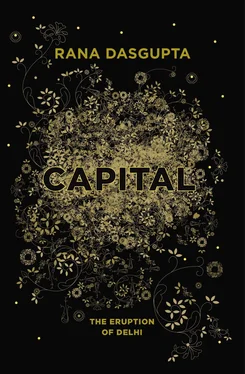Siddhartha says nothing. He waits for his mother to leave the room.
“For a long time I didn’t think about getting married because I didn’t want anyone to interfere with my work and my savings. But now I want to get married and I cannot. Arranged marriages are impossible for me because I can’t make a life-long decision about a woman based on an hour’s conversation. At the same time, all the women of my own age are already married. And I’m not a flamboyant person who knows how to go out and talk to young women.
“The people who are in their twenties now don’t know what the real India was. They live frivolously because they have never seen reality. They have never seen the hardship of life. People have stopped taking life seriously because they know they can easily get a job. I don’t enjoy talking to this generation. I find it more satisfying talking to older people, who have seen hardship. They talk more sense.”
Siddhartha harbours great ambivalence about the world that has provided him with his material basis. It seems full of moral threat to him, and the fact he is not married is just a part of the general, almost monastic, seclusion he maintains outside work. Though he has devoted all of the last decade’s energies to accessing the rewards of the new business machine, he has at the same time been anxious to keep its social and spiritual implications at bay. He never attends the many parties and outings organised by his youthful colleagues. After ten years in the capital, Siddhartha’s mistrust of its culture remains intact. He hopes one day to return to Kolkata and to live once more among people with values like his.
“I don’t see those values in Delhi. I would never marry a woman who comes into the office with her shoulders bare. A woman can be very attractive without baring herself. In Kolkata you hardly ever see women wearing clothes that are so revealing. What possible reason could there be for wearing such clothes? India has a culture. We are not America. India has a culture of its own but we are in danger of losing it because we don’t value anything anymore. Everything comes too easily now, and all people think about is spending money and having fun.”
Perhaps this is why, after ten years of living in Delhi, Siddhartha and his brother have hardly a possession to their name. This is a spectacularly empty apartment. A few folding chairs, a small television and an air cooler are pretty much the only additions they have made to the landlord’s basic furniture. There are battery-operated clocks on the walls of each room but nothing else. In the mother’s bedroom is a small shrine and a photograph of her dead husband. Clothes and personal effects are locked away in steel armoires. The few objects on the built-in bookshelf in the corner of the living room serve only to emphasise how large and empty it is. There is a small model of the Eiffel Tower and a propped-up set of coasters, which have never been taken out of their plastic box, showing the landmarks and boulevards of Paris. There is a statue of Ganesh, a plastic plant and five Bengali novels.
It feels as if they are living in permanent temporariness, acquiring nothing that might stand as an obstacle between them and their eventual retreat from this cultureless place.
“There has to be some culture which is inherited from our ancestors. Just take the example of these pubs. Indian culture has never been used to this. Now the young are going there and it’s become part of their lifestyle. So if they were managing with 20,000 rupees a month, now they need 30,000. I’m not saying you shouldn’t go to pubs but you must not lose yourself and your culture. Otherwise it will be a dog-eat-dog world.”
When, recently, I attended the celebration of Siddhartha’s arranged nuptials, it occurred to me that he has in one sense conspicuously preserved the culture of his ancestors. Siddhartha, in fact, is my cousin, and shares with me a long-dead Bengali grandfather with an almost neurotic admiration for the English language. The family’s facility with English persisted through the generations, and helped enable Siddhartha, so many decades later, to secure his job in a Delhi call centre.
At the first party I went to in Delhi, I saw a couple smooching, and I asked myself, How can anybody do that in the open? It was a shock to me. But it was nice. I understood what sort of opportunities there were for me here. I could have an unconventional youth and an unconventional career.
— Ramesh
The advent of the corporation unleashed powerful new energies into the lives, especially, of young people. After 1991, the entire capitalist infrastructure needed to be built, and there was exciting work to be found in every domain. As the capital of Indian journalism, Delhi played host to an explosion of new newspapers, magazines, TV stations and advertising agencies, and young people with degrees in subjects hitherto considered useless, such as English literature or history, now found themselves running companies, commanding high salaries — and working extremely hard. Their parents, who had often worked in government jobs requiring not more than forty hours of their week, looked on in bewilderment as their offspring returned from the office at 11 p.m. only to receive further telephone instructions from sleepless bosses. Nor could these parents comprehend the nonchalance with which their children leapt every year or so from one job to another, driving up their income each time. They had grown up in the belief that avoiding risk was the most important principle, and that if you found a good job you kept it for life. But these young people seemed to be drawn inexorably towards the desecration of the status quo, as if the receipt of capitalism’s true blessings depended on it.
Many young people stayed late in the office not only because they had to but just because they liked it. It was an era when the corporation often seemed to be life-giving in a way that the family was not, and many of them turned to it for entirely non-professional needs, including, simply, a place to be away from the family home. The corporate mission was new and heroic, and could provide collegial relationships that seemed intrepid and profound, and young people spoke often about how their parents or spouses did not understand what they did which meant, now, who they were. In those early years of corporate euphoria, the corporation often became a kind of family of its own, and young executives began to develop a kind of affected corporate-speak that was intended to mark them out as separate from the ethos of their blood relatives. They no longer had a reputation , they had a brand . Things they did well were core competencies. They did not wonder, they brainstormed . Their DNA came from the corporation, whose traits they attempted to adopt more and more as their own.
This energy, with which such people sought their sense of purpose from the new institutions of global capitalism, had much to do with the withering of previous ideals. Such corporate enthusiasm could often be observed most powerfully, in fact, in the very families that had most whole-heartedly embraced the earlier ethos of frugality, service and nation. Many of those families had ended up feeling deceived, for when the system lost all its drapery in the 1970s it seemed there was nothing beneath save the struggle for power and money, and it no longer felt so easy to disdain those who cherished such things. In the wake of the high-minded Nehruvian vision were many disappointed middle-class people, and one legacy of this was the discrediting of ideals themselves. Many of those who came of age in the 1980s and ’90s ridiculed their parents for believing in abstractions, and they embraced the principle of profit with relief. It was a new reality principle, and they remade themselves eagerly around it.
Читать дальше











